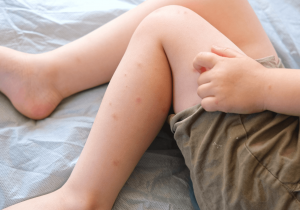
What is measles?
Today, measles has gone viral. Actually, it always has been. Measles is one of the most contagious viral infections and can lead to life-threatening health complications for children and adults alike. After decades of being under control, the virus is surging as news of outbreaks keeps making headlines. With its recent resurgence, questions and worries about measles are spreading as quickly as the virus itself. So, discover more about measles and its renewed prevalence, along with the causes and the factors affecting your chances of catching a case. Then, check out the symptoms and effective treatments to help you stay well aware, and ahead, of this dangerous disease.
Catch on to measles
Measles is more than just a high fever or a rash that simply subsides in a couple of days. Also known as rubeola, measles is a serious illness caused by a highly contagious virus that is easily spread from person to person through the air or by touching infected surfaces when a person with measles sneezes, coughs, talks, or breathes. According to medical experts, measles is so contagious that up to 90% of people near an infected individual will become infected themselves if they haven’t been vaccinated for measles.
The viral spread of measles
Measles is making an unwanted and unwelcome comeback. The disease can infect and affect anyone but is most commonly seen in children. For nearly 50 years, widespread vaccination for measles during childhood in the United States had put the virus completely out of sight and out of mind. But in recent years, outbreaks are occurring mostly among unvaccinated individuals. Recent reports from the CDC show that there have been 44 outbreaks of measles in the United States—affecting more than 1,300 people—in 2025 alone.
Causes of the contagion
Measles is caused by a virus that rapidly spreads among people through the air, as well as by touching an infected surface and then touching your eyes, nose, or mouth. An outbreak of measles can occur anywhere in the world. In the United States, outbreaks of measles have occurred where immunization rates are low. As a result, unvaccinated individuals spread it to their unvaccinated families and communities, while unvaccinated travelers visiting an area with an outbreak can be infected and then carry the virus back home to spread.
A rash of risk factors
With measles, everyone who hasn’t been vaccinated against measles runs a risk of getting sick. The disease is dangerous for anyone at any age, but the risk of complications is highest for certain groups of people, including:
- Children under age five
- Adults over 20 years old
- People with weak immune systems
- Pregnant women
An outbreak of symptoms
Measles may spread very quickly, but the symptoms of a case can take some time to appear. The first signs typically show between seven and 14 days after contact with the virus. Victims of the virus have reported several similar symptoms, but these don’t all appear at once. The first signs are usually a high fever or bad cough, but a few days later a dark rash will begin. Some of the most serious complications include severe diarrhea, pneumonia, bronchitis, and encephalitis.
If you or a loved one experience any of the following symptoms or have been exposed to measles, it’s critical to contact your SignatureMD-affiliated doctor immediately to get tested and save yourself and others from suffering. The most commonly experienced symptoms of measles include:
- High fever
- Cough
- Runny nose
- Red, watery eyes
- Rash
The best shot at treatment
Currently, there’s no cure and no specific medication to treat measles. Instead, the focus is on easing the symptoms and addressing complications as they arise. Any symptoms are usually relieved with over-the-counter pain relievers, plenty of rest, and fluids, while other therapies like antibiotics and vitamin A supplementation are only prescribed under medical supervision. Prevention is still the best medicine. And the best way to prevent the sickness and suffering from measles is to consider getting the highly effective MMR (measles, mumps, and rubella) vaccine. One dose of the vaccine is 93% effective at preventing measles, and two doses is 97% effective.
It’s vital for people to understand that when it comes to measles, prevention is the best protection to stop the spread.